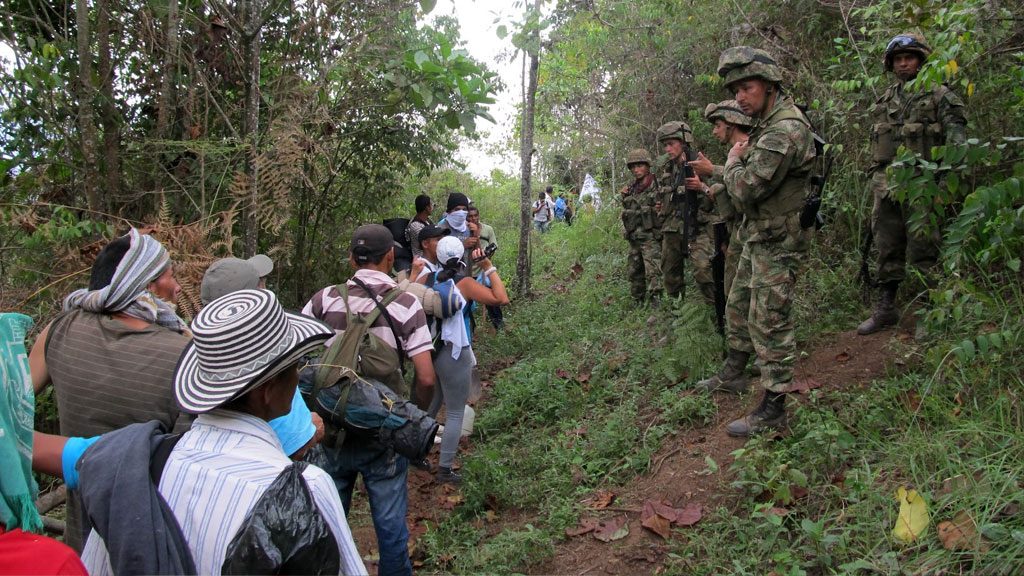The Colombian government must ensure indigenous and Afro-Colombian communities uprooted by warring factions can return home and have a greater say in how their lands are developed, rights group Amnesty International said.
Over five decades of conflict, more than six million Colombians have been forced off their land by fighting among Marxist rebels, right-wing paramilitaries and government troops, government figures show.
The issue of how to return stolen and abandoned land to its rightful owners is a key talking point at peace talks in Cuba between the government and the rebel Revolutionary Armed Forces of Colombia (FARC).
Displaced communities wanting to return also face the problem of exploitation by mining companies, according to a report published by Amnesty on Wednesday.
“Any peace deal will be meaningless unless the rights of Indigenous and Afro-descendant communities to return to their lands and decide how they are used are prioritized above companies’ desire to exploit those lands for their own profit,” said Erika Guevara, Amnesty’s Americas director, in a statement.
At least eight million hectares of land – some 14 percent of Colombian territory – have been abandoned or illegally acquired through fraud, violence or extortion, the report said.
Most of those affected are farming, indigenous and Afro-Colombian communities who earn their living from their land and whose land is rich in resources.
Displaced people who owned their land are eligible to claim it back under a historic land restitution law passed in 2011.
The law, a crucial reform of the government of Juan Manuel Santos, aims to return millions of hectares of stolen land to its rightful owners and to enable displaced people to return home and claim reparations.
The law is a “significant step forward,” but land return is plagued by problems ranging from bureaucracy to intimidation, including death threats against claimants, Amnesty said.
“Nearly four years since the process began … only a relatively small proportion of such lands have been returned to their rightful occupants,” the report said.
Ricardo Sabogal, who heads the government entity charged with overseeing land restitution, said the government has handed back 173,000 hectares of land benefiting about 20,000 Colombians.
“It’s not easy to push ahead with a process of land restitution in the middle of a conflict,” Sabogal told the Thomson Reuters Foundation in an interview.
“That’s why peace is so important, so that families can go back quickly and safely to their lands.”
He said ensuring displaced people return to their lands is also made difficult because of landmines, mostly planted by FARC rebels, littering parts of the countryside.
Since 2000, successive governments have granted licenses to local and international mining and other companies looking to tap into Colombia’s mineral and oil resources, the report said.
The economy is driven by commodity exports, and the country is Latin America’s fourth largest oil producer.
By law, companies planning projects must first consult communities living on or using the land they want to exploit.
Amnesty said it had written to several companies with mining projects on lands where indigenous communities live.
In response mining company AngloGold Ashanti, which operates gold mines in western Choco province, told Amnesty it was committed to the “lawful consent of indigenous communities” for projects on lands traditionally owned or used by ethnic groups “and are likely to have a significant impact on these groups.”
But Amnesty said in general licenses have often been granted to companies which have not consulted communities nor obtained their free and informed consent.
“Unless the authorities can ensure that these rights are effectively respected as a matter of urgency … it risks leaving one of the principal causes of the armed conflict unresolved. This could have serious repercussions for the long-term viability of any eventual peace agreement,” the report said.
(Reporting by Anastasia Moloney, editing by Tim Pearce. Please credit the Thomson Reuters Foundation, the charitable arm of Thomson Reuters, that covers humanitarian news, women’s rights, trafficking, corruption and climate change. Visit www.trust.org)


